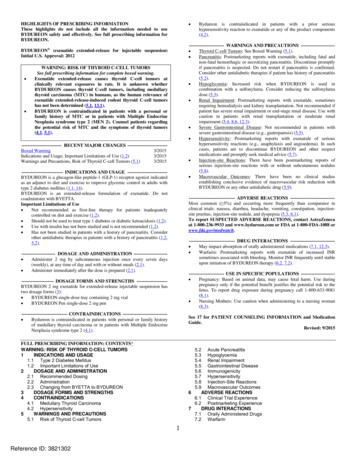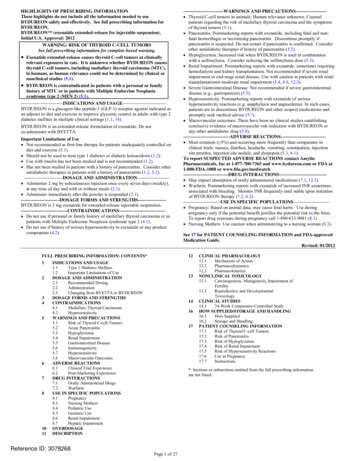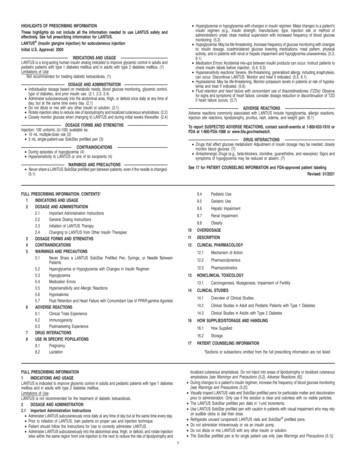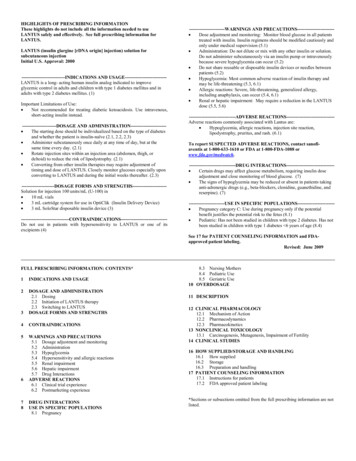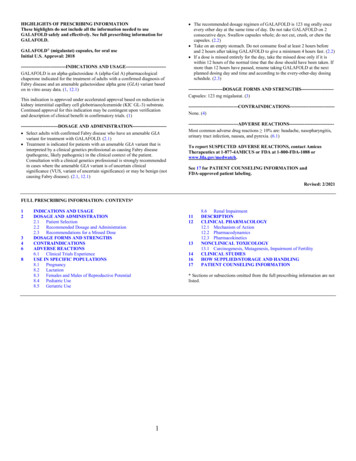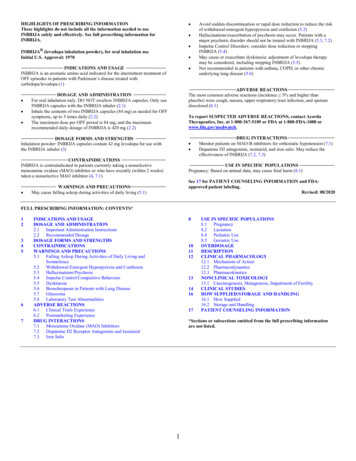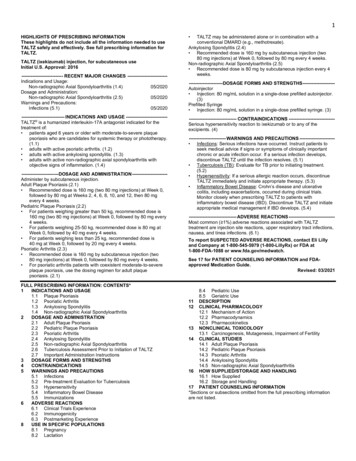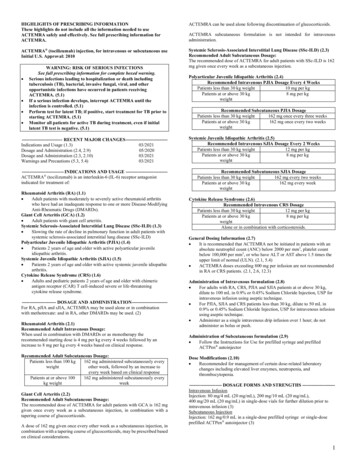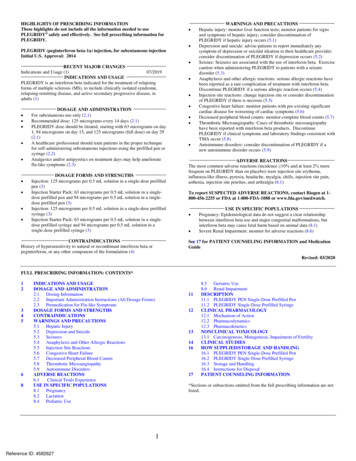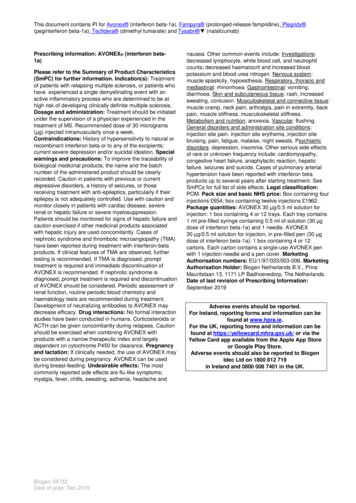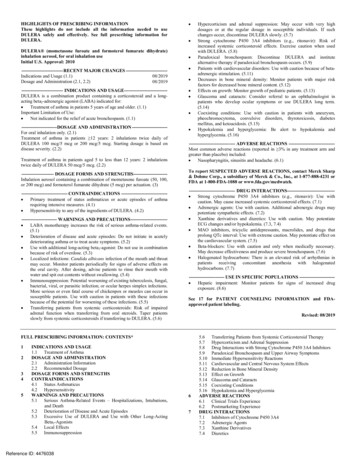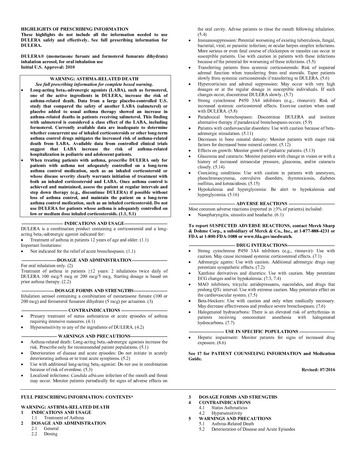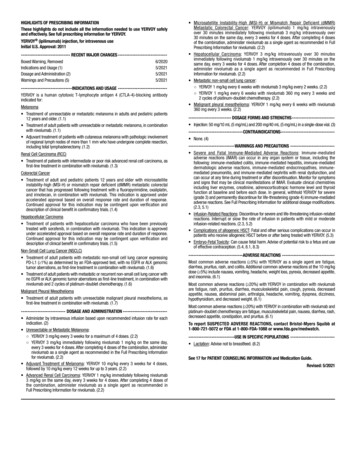
Transcription
HIGHLIGHTS OF PRESCRIBING INFORMATIONThese highlights do not include all the information needed to use YERVOY safelyand effectively. See full prescribing information for YERVOY.YERVOY (ipilimumab) injection, for intravenous useInitial U.S. Approval: 2011------------------------------ RECENT MAJOR CHANGES------------------------------Boxed Warning, Removed6/2020Indications and Usage (1)5/2021Dosage and Administration (2)5/2021Warnings and Precautions S AND USAGE------------------------------YERVOY is a human cytotoxic T-lymphocyte antigen 4 (CTLA-4)-blocking antibodyindicated for:Melanoma Treatment of unresectable or metastatic melanoma in adults and pediatric patients12 years and older. (1.1) Treatment of adult patients with unresectable or metastatic melanoma, in combinationwith nivolumab. (1.1) Adjuvant treatment of patients with cutaneous melanoma with pathologic involvementof regional lymph nodes of more than 1 mm who have undergone complete resection,including total lymphadenectomy. (1.2)Renal Cell Carcinoma (RCC) Treatment of patients with intermediate or poor risk advanced renal cell carcinoma, asfirst-line treatment in combination with nivolumab. (1.3)Colorectal Cancer Treatment of adult and pediatric patients 12 years and older with microsatelliteinstability-high (MSI-H) or mismatch repair deficient (dMMR) metastatic colorectalcancer that has progressed following treatment with a fluoropyrimidine, oxaliplatin,and irinotecan, in combination with nivolumab. This indication is approved underaccelerated approval based on overall response rate and duration of response.Continued approval for this indication may be contingent upon verification anddescription of clinical benefit in confirmatory trials. (1.4)Hepatocellular Carcinoma Treatment of patients with hepatocellular carcinoma who have been previouslytreated with sorafenib, in combination with nivolumab. This indication is approvedunder accelerated approval based on overall response rate and duration of response.Continued approval for this indication may be contingent upon verification anddescription of clinical benefit in confirmatory trials. (1.5)Non-Small Cell Lung Cancer (NSCLC) Treatment of adult patients with metastatic non-small cell lung cancer expressingPD-L1 ( 1%) as determined by an FDA-approved test, with no EGFR or ALK genomictumor aberrations, as first-line treatment in combination with nivolumab. (1.6) Treatment of adult patients with metastatic or recurrent non-small cell lung cancer withno EGFR or ALK genomic tumor aberrations as first-line treatment, in combination withnivolumab and 2 cycles of platinum-doublet chemotherapy. (1.6)Malignant Pleural Mesothelioma Treatment of adult patients with unresectable malignant pleural mesothelioma, asfirst-line treatment in combination with nivolumab. (1.7)--------------------------- DOSAGE AND ADMINISTRATION--------------------------- Administer by intravenous infusion based upon recommended infusion rate for eachindication. (2) Unresectable or Metastatic Melanoma: YERVOY 3 mg/kg every 3 weeks for a maximum of 4 doses. (2.2) YERVOY 3 mg/kg immediately following nivolumab 1 mg/kg on the same day,every 3 weeks for 4 doses. After completing 4 doses of the combination, administernivolumab as a single agent as recommended in the Full Prescribing Informationfor nivolumab. (2.2) Adjuvant Treatment of Melanoma: YERVOY 10 mg/kg every 3 weeks for 4 doses,followed by 10 mg/kg every 12 weeks for up to 3 years. (2.2) Advanced Renal Cell Carcinoma: YERVOY 1 mg/kg immediately following nivolumab3 mg/kg on the same day, every 3 weeks for 4 doses. After completing 4 doses ofthe combination, administer nivolumab as a single agent as recommended inFull Prescribing Information for nivolumab. (2.2) Microsatellite Instability-High (MSI-H) or Mismatch Repair Deficient (dMMR)Metastatic Colorectal Cancer: YERVOY (ipilimumab) 1 mg/kg intravenouslyover 30 minutes immediately following nivolumab 3 mg/kg intravenously over30 minutes on the same day, every 3 weeks for 4 doses. After completing 4 dosesof the combination, administer nivolumab as a single agent as recommended in FullPrescribing Information for nivolumab. (2.2) Hepatocellular Carcinoma: YERVOY 3 mg/kg intravenously over 30 minutesimmediately following nivolumab 1 mg/kg intravenously over 30 minutes on thesame day, every 3 weeks for 4 doses. After completion 4 doses of the combination,administer nivolumab as a single agent as recommended in Full PrescribingInformation for nivolumab. (2.2) Metastatic non-small cell lung cancer: YERVOY 1 mg/kg every 6 weeks with nivolumab 3 mg/kg every 2 weeks. (2.2) YERVOY 1 mg/kg every 6 weeks with nivolumab 360 mg every 3 weeks and2 cycles of platinum-doublet chemotherapy. (2.2) Malignant pleural mesothelioma: YERVOY 1 mg/kg every 6 weeks with nivolumab360 mg every 3 weeks. (2.2)-------------------------- DOSAGE FORMS AND STRENGTHS-------------------------- Injection: 50 mg/10 mL (5 mg/mL) and 200 mg/40 mL (5 mg/mL) in a single-dose vial. ONS-------------------------------- None. (4)----------------------------WARNINGS AND PRECAUTIONS--------------------------- Severe and Fatal Immune-Mediated Adverse Reactions: Immune-mediatedadverse reactions (IMAR) can occur in any organ system or tissue, including thefollowing: immune-mediated colitis, immune-mediated hepatitis, immune-mediateddermatologic adverse reactions, immune-mediated endocrinopathies, immunemediated pneumonitis, and immune-mediated nephritis with renal dysfunction, andcan occur at any time during treatment or after discontinuation. Monitor for symptomsand signs that may be clinical manifestations of IMAR. Evaluate clinical chemistriesincluding liver enzymes, creatinine, adrenocorticotropic hormone level and thyroidfunction at baseline and before each dose. In general, withhold YERVOY for severe(grade 3) and permanently discontinue for life-threatening (grade 4) immune-mediatedadverse reactions. See Full Prescribing Information for additional dosage modifications.(2.3, 5.1) Infusion-Related Reactions: Discontinue for severe and life-threatening infusion-relatedreactions. Interrupt or slow the rate of infusion in patients with mild or moderateinfusion-related reactions. (2.3, 5.2) Complications of allogeneic HSCT: Fatal and other serious complications can occur inpatients who receive allogeneic HSCT before or after being treated with YERVOY. (5.3) Embryo-Fetal Toxicity: Can cause fetal harm. Advise of potential risk to a fetus and useof effective contraception. (5.4, 8.1, 8.3)---------------------------------ADVERSE REACTIONS--------------------------------Most common adverse reactions ( 5%) with YERVOY as a single agent are fatigue,diarrhea, pruritus, rash, and colitis. Additional common adverse reactions at the 10 mg/kgdose ( 5%) include nausea, vomiting, headache, weight loss, pyrexia, decreased appetite,and insomnia. (6.1)Most common adverse reactions ( 20%) with YERVOY in combination with nivolumabare fatigue, rash, pruritus, diarrhea, musculoskeletal pain, cough, pyrexia, decreasedappetite, nausea, abdominal pain, arthralgia, headache, vomiting, dyspnea, dizziness,hypothyroidism, and decreased weight. (6.1)Most common adverse reactions ( 20%) with YERVOY in combination with nivolumab andplatinum-doublet chemotherapy are fatigue, musculoskeletal pain, nausea, diarrhea, rash,decreased appetite, constipation, and pruritus. (6.1)To report SUSPECTED ADVERSE REACTIONS, contact Bristol-Myers Squibb at1-800-721-5072 or FDA at 1-800-FDA-1088 or SE IN SPECIFIC POPULATIONS--------------------------- Lactation: Advise not to breastfeed. (8.2)See 17 for PATIENT COUNSELING INFORMATION and Medication Guide.Revised: 5/2021
FULL PRESCRIBING INFORMATION: CONTENTS *123456INDICATIONS AND USAGE1.1Unresectable or Metastatic Melanoma1.2Adjuvant Treatment of Melanoma1.3Advanced Renal Cell Carcinoma1.4Microsatellite Instability-High or Mismatch Repair Deficient MetastaticColorectal Cancer1.5Hepatocellular Carcinoma1.6Metastatic Non-Small Cell Lung Cancer1.7Malignant Pleural MesotheliomaDOSAGE AND ADMINISTRATION2.1Patient Selection2.2Recommended Dosage2.3Recommended Dosage Modifications for Adverse Reactions2.4Preparation and AdministrationDOSAGE FORMS AND STRENGTHSCONTRAINDICATIONSWARNINGS AND PRECAUTIONS5.1Severe and Fatal Immune-Mediated Adverse Reactions5.2Infusion-Related Reactions5.3Complications of Allogeneic Hematopoietic Stem Cell Transplant afterYERVOY5.4Embryo-Fetal Toxicity5.5Risks Associated When Administered in Combination with NivolumabADVERSE REACTIONS6.1Clinical Trials Experience6.2ImmunogenicityFULL PRESCRIBING INFORMATION1INDICATIONS AND USAGE1.1Unresectable or Metastatic MelanomaYERVOY (ipilimumab) is indicated for the treatment of unresectable or metastaticmelanoma in adults and pediatric patients 12 years and older.YERVOY, in combination with nivolumab, is indicated for the treatment of unresectable ormetastatic melanoma in adult patients.1.2Adjuvant Treatment of MelanomaYERVOY is indicated for the adjuvant treatment of patients with cutaneous melanomawith pathologic involvement of regional lymph nodes of more than 1 mm who haveundergone complete resection, including total lymphadenectomy.1.3Advanced Renal Cell CarcinomaYERVOY, in combination with nivolumab, is indicated for the first-line treatment ofpatients with intermediate or poor risk advanced renal cell carcinoma (RCC).1.4Microsatellite Instability-High or Mismatch Repair Deficient MetastaticColorectal CancerYERVOY, in combination with nivolumab, is indicated for the treatment of adult andpediatric patients 12 years and older with microsatellite instability-high (MSI-H) ormismatch repair deficient (dMMR) metastatic colorectal cancer (mCRC) that hasprogressed following treatment with a fluoropyrimidine, oxaliplatin, and irinotecan.This indication is approved under accelerated approval based on overall responserate and duration of response [see Clinical Studies (14.4)]. Continued approval for thisindication may be contingent upon verification and description of clinical benefit inconfirmatory trials.1.5Hepatocellular CarcinomaYERVOY, in combination with nivolumab, is indicated for the treatment of patients withhepatocellular carcinoma (HCC) who have been previously treated with sorafenib.This indication is approved under accelerated approval based on overall responserate and duration of response [see Clinical Studies (14.5)]. Continued approval for thisindication may be contingent upon verification and description of clinical benefit in theconfirmatory trials.1.6Metastatic Non-Small Cell Lung CancerYERVOY, in combination with nivolumab, is indicated for the first-line treatment ofadult patients with metastatic non-small cell lung cancer (NSCLC) whose tumorsexpress PD-L1 ( 1%) as determined by an FDA-approved test [see Dosage andAdministration (2.1)], with no EGFR or ALK genomic tumor aberrations.YERVOY, in combination with nivolumab and 2 cycles of platinum-doublet chemotherapy,is indicated for the first-line treatment of adult patients with metastatic or recurrentNSCLC, with no EGFR or ALK genomic tumor aberrations.81112131416176.3Postmarketing ExperienceUSE IN SPECIFIC POPULATIONS8.1Pregnancy8.2Lactation8.3Females and Males of Reproductive Potential8.4Pediatric Use8.5Geriatric UseDESCRIPTIONCLINICAL PHARMACOLOGY12.1 Mechanism of Action12.3 PharmacokineticsNONCLINICAL TOXICOLOGY13.1 Carcinogenesis, Mutagenesis, Impairment of FertilityCLINICAL STUDIES14.1 Unresectable or Metastatic Melanoma14.2 Adjuvant Treatment of Melanoma14.3 Advanced Renal Cell Carcinoma14.4 Microsatellite Instability-High or Mismatch Repair Deficient MetastaticColorectal Cancer14.5 Hepatocellular Carcinoma14.6 Metastatic Non-Small Cell Lung Cancer14.7 Malignant Pleural MesotheliomaHOW SUPPLIED/STORAGE AND HANDLINGPATIENT COUNSELING INFORMATION* Sections or subsections omitted from the full prescribing information are not listed.1.7Malignant Pleural MesotheliomaYERVOY (ipilimumab), in combination with nivolumab, is indicated for the first-linetreatment of adult patients with unresectable malignant pleural mesothelioma.2DOSAGE AND ADMINISTRATION2.1Patient SelectionSelect patients with metastatic NSCLC for treatment with YERVOY in combination withnivolumab based on PD-L1 expression [see Clinical Studies (14.6)].Information on FDA-approved tests for the determination of PD-L1 expression in NSCLCis available at: nded DosageThe recommended dosages of YERVOY as a single agent are presented in Table 1.Table 1:Recommended Dosages for YERVOY as a Single AgentIndicationRecommended YERVOY DosageDuration of TherapyUnresectable ormetastatic melanoma3 mg/kg every 3 weeks(90-minute intravenous infusion)Maximum of 4 dosesAdjuvant treatment ofmelanoma10 mg/kg every 3 weeks followedby 10 mg/kg every 12 weeks(90-minute intravenous infusion)Every 3 weeks up to amaximum of 4 dosesEvery 12 weeks for upto 3 yearsThe recommended dosages of YERVOY in combination with other therapeutic agents arepresented in Table 2. Refer to the respective Prescribing Information for each therapeuticagent administered in combination with YERVOY for recommended dosage information,as appropriate.Table 2:Recommended Dosages of YERVOY in Combination with OtherTherapeutic Agents*IndicationUnresectable ormetastatic melanomaRecommended YERVOY DosageDuration of Therapy3 mg/kg every 3 weeks(90-minute intravenous infusion)with nivolumab 1 mg/kg(30-minute intravenous infusion onthe same day)In combination withnivolumab for a maximumof 4 doses or untilunacceptable toxicity,whichever occurs earlier.After completing 4 dosesof combination therapy,administer nivolumab as asingle agent untildisease progression orunacceptable toxicity.†(Continued)
YERVOY (ipilimumab)YERVOY (ipilimumab)Table 2:Recommended Dosages of YERVOY in Combination with Other(Continued) Therapeutic Agents*IndicationRecommended YERVOY DosageDuration of Therapy1 mg/kg every 3 weekswith nivolumab 3 mg/kg(30-minute intravenous infusionon the same day)In combination withnivolumab for a maximumof 4 doses.After completing 4 dosesof combination therapy,administer nivolumab assingle agent untildisease progression orunacceptable toxicity.†1 mg/kg every 3 weekswith nivolumab 3 mg/kg(30-minute intravenous infusionon the same day)After completing 4 dosesof combination therapy,administer nivolumab assingle agent untildisease progression orunacceptable toxicity.†3 mg/kg every 3 weekswith nivolumab 1 mg/kg(30-minute intravenous infusionon the same day)In combination withnivolumab for 4 doses.After completing 4 dosesof combination therapy,administer nivolumab assingle agent untildisease progression orunacceptable toxicity.†Metastatic non-smallcell lung cancerexpressing PD-L11 mg/kg every 6 weekswith nivolumab 3 mg/kgevery 2 weeks(30-minute intravenous infusion)In combination withnivolumab until diseaseprogression, unacceptabletoxicity, or up to 2 yearsin patients withoutdisease progression.†Metastatic or recurrentnon-small cell lungcancer1 mg/kg every 6 weekswith nivolumab 360 mgevery 3 weeks(30-minute intravenous infusion)and histology-basedplatinum-doublet chemotherapyevery 3 weeksAdvanced renal cellcarcinomaMicrosatelliteinstability-high (MSI-H)or mismatch repairdeficient (dMMR)metastatic colorectalcancerHepatocellularcarcinomaMalignant pleuralmesothelioma*†1 mg/kg every 6 weekswith nivolumab 360 mgevery 3 weeks(30-minute intravenous infusion)In combination withnivolumab until diseaseprogression, unacceptabletoxicity, or up to 2 yearsin patients withoutdisease progression.†2 cycles of histologybased platinum-doubletchemotherapyIn combination withnivolumab until diseaseprogression, unacceptabletoxicity, or up to 2 yearsin patients withoutdisease progression.†Refer to the Prescribing Information for the agents administered in combination withYERVOY for recommended dosing information, as appropriate.Refer to the Prescribing Information for nivolumab for dosage information aftercompleting use in combination with YERVOY.2.3Recommended Dosage Modifications for Adverse ReactionsNo dose reduction for YERVOY is recommended. In general, withhold YERVOY for severe(Grade 3) immune-mediated adverse reactions. Permanently discontinue YERVOYfor life-threatening (Grade 4) immune-mediated adverse reactions, recurrent severe(Grade 3) immune-mediated reactions that require systemic immunosuppressivetreatment, persistent moderate (Grade 2) or severe (Grade 3) reactions lasting 12 weeksor longer after last YERVOY dose (excluding endocrinopathy), or an inability to reducecorticosteroid dose to 10 mg or less of prednisone or equivalent per day within 12 weeksof initiating steroids. Dosage modifications for YERVOY or YERVOY in combination withnivolumab for adverse reactions that require management different from these generalguidelines are summarized in Table 3.When YERVOY is administered in combination with nivolumab, withhold or permanentlydiscontinue both YERVOY and nivolumab for toxicity.Table 3:Recommended Dosage Modifications for Adverse ReactionsAdverse ReactionSeverity*Dosage ModificationsImmune-Mediated Adverse Reactions [See Warnings and Precautions (5.1)]Grade 2WithholdaGrade 3 or 4Permanently discontinueAST or ALT increases to morethan 3 times and up to 5 timesthe ULNorTotal bilirubin increases tomore than 1.5 times and up to3 times the ULNWithholdaAST or ALT more than 5 timesthe ULNorTotal bilirubin more than3 times the ULNPermanently discontinueBaseline AST/ALT is more than1 and up to 3 times ULN andincreases to more than 5 andup to 10 times ULNorBaseline AST/ALT is more than3 and up to 5 times ULN andincreases to more than 8 andup to 10 times ULN.WithholdaAST/ALT increases to morethan 10 times ULNorTotal bilirubin increases tomore than 3 times ULN.Permanently ted SJS, TEN, or DRESSWithholdConfirmed SJS, TEN, or DRESSPermanently discontinueEndocrinopathiesdGrades 3 or 4Withhold until clinically stableor permanently discontinuedepending on severityGrade 2WithholdaGrade 3 or 4Permanently discontinueGrade 2 or 3 increased bloodcreatinineWithholdaGrade 4 increased bloodcreatininePermanently discontinueGrade 2WithholdaColitisHepatitis with notumor involvement ofthe liverorHepatitis with tumorinvolvement of theliver/non-HCCHepatitis with tumorinvolvement of theliverb/HCCcPneumonitisNephritis with RenalDysfunctionNeurological ToxicitiesGrade 3 or 4Permanently discontinueMyocarditisGrade 2, 3 or 4Permanently discontinueOphthalmologicGrade 2, 3, or 4 that does notimprove to Grade 1 within2 weeks while receivingtopical therapy or that requiressystemic treatmentPermanently discontinueOther Adverse ReactionsInfusion-RelatedReactions [seeWarnings andPrecautions (5.2)]Grade 1 or 2Interrupt or slow the rate ofinfusionGrade 3 or 4Permanently discontinueALT alanine aminotransferase, AST aspartate aminotransferase, DRESS Drug Rashwith Eosinophilia and Systemic Symptoms, SJS Stevens Johnson Syndrome,TEN toxic epidermal necrolysis, ULN upper limit of normal* Based on Common Terminology Criteria for Adverse Events (CTCAE), Version 4.03a Resume in patients with complete or partial resolution (Grade 0 or 1) after corticosteroidtaper. Permanently discontinue if no complete or partial resolution within 12 weeks oflast dose or inability to reduce prednisone to 10 mg per day (or equivalent) or lesswithin 12 weeks of initiating steroids.b If AST/ALT are less than or equal to ULN at baseline, withhold or permanentlydiscontinue YERVOY based on recommendations for hepatitis with no liver involvement.c This guidance is only applicable to HCC patients who are being treated with YERVOY incombination with nivolumab.d Depending on clinical severity, consider withholding for Grade 2 endocrinopat
FULL PRESCRIBING INFORMATION 1 INDICATIONS AND USAGE 1.1 Unresectable or Metastatic Melanoma YERVOY (ipilimumab) is indicated for the treatment of unresectable or metastatic mela
